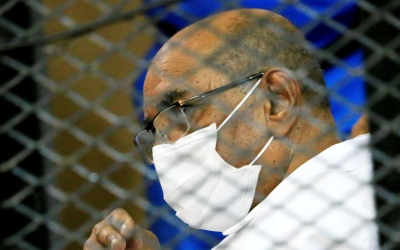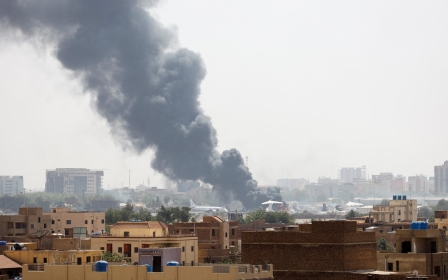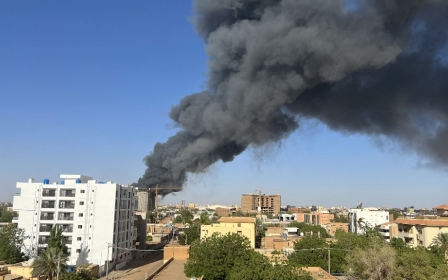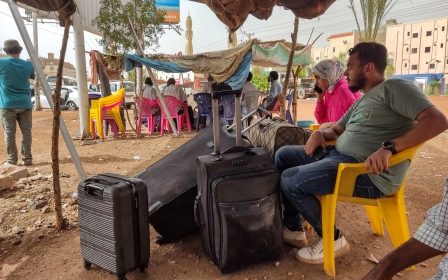UK: No safe routes for Sudan refugees
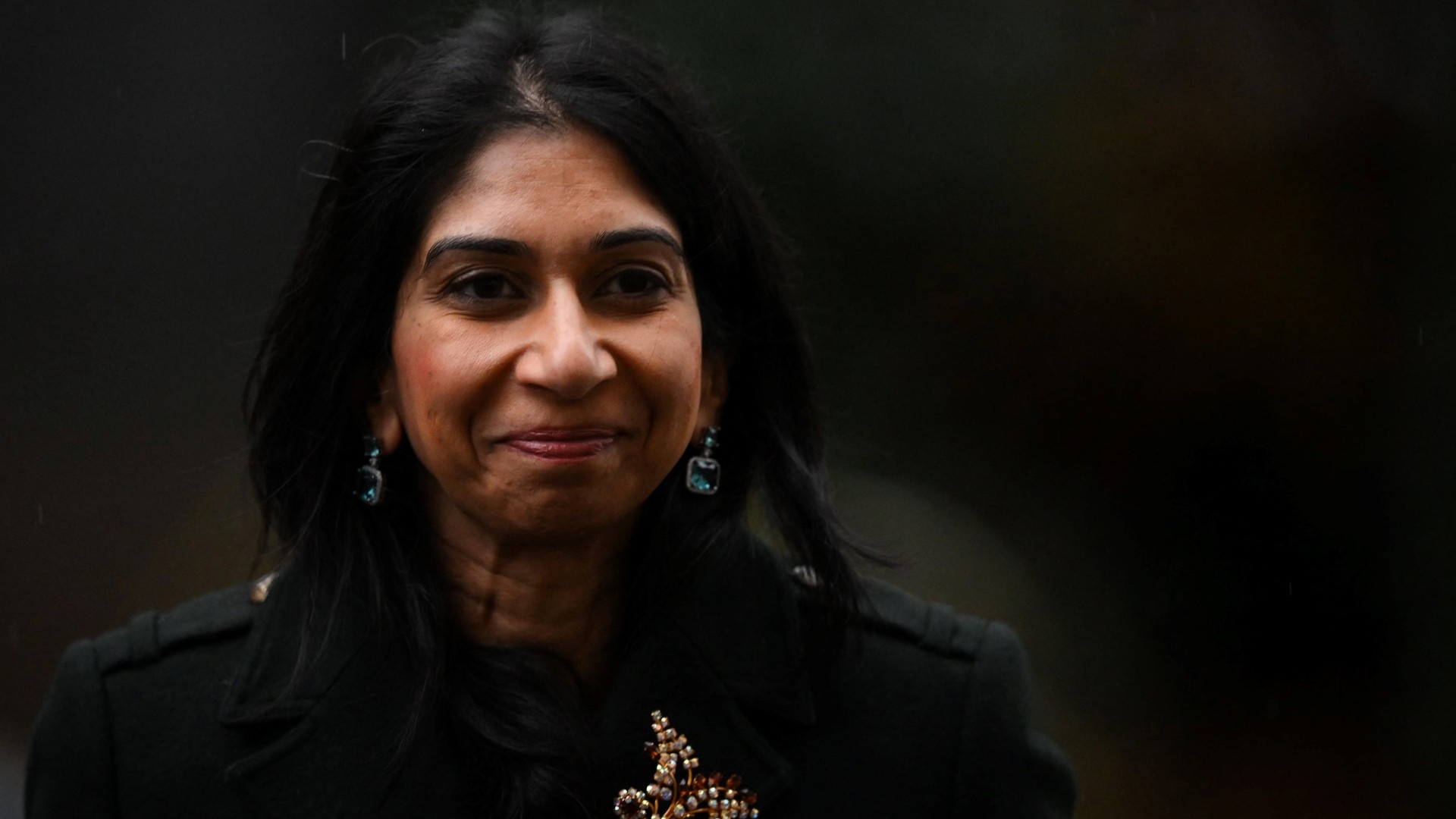
The UK government has no current plans to introduce safe routes into the country for refugees fleeing the conflict in Sudan, as it did for Ukrainians last year.
Over 400 people have died since fighting broke out between the Sudanese army and the Rapid Support Forces (RSF) paramilitaries, sparked by plans to integrate the RSF into the armed forces.
The violence has left tens of thousands of Sudanese civilians fleeing abroad, with many escaping to neighbouring Chad, South Sudan and Egypt.
Asked on Wednesday if it had plans to welcome refugees fleeing violence in Sudan, a UK Home Office spokesperson told MEE: “We are monitoring the situation closely to ensure that we are able to respond appropriately.”
The statement added that the UK’s current settlement schemes had helped nearly 500,000 people fleeing “regions of conflict and instability” since 2015, including in Syria, Afghanistan and Ukraine.
New MEE newsletter: Jerusalem Dispatch
Sign up to get the latest insights and analysis on Israel-Palestine, alongside Turkey Unpacked and other MEE newsletters
“While our safe and legal routes are some of the most generous anywhere, we cannot accommodate everyone who wants to come to the UK and we are not able to open a bespoke route for every situation,” the spokesperson said.
“The UK also does not accept asylum claims from overseas and there are no visa routes to enable people to claim asylum here.”
In the lengthy statement and background information sent to MEE by the Home Office, numbering over 400 words, the word "Sudan" was not mentioned once.
Mohamed*, a 30-year-old asylum seeker from the Darfur region in Sudan who arrived in the UK in 2020, told MEE he hoped the UK government would provide sanctuary to Sudanese refugees.
'It’s very hard now in the UK, as a Sudanese, to claim asylum'
- Mohamed, asylum seeker in UK
“The people of Sudan have nothing to do with this war. All they want is a safe place to stay. The British government should open safe routes for them,” he said, adding that he was devastated to learn that his aunt had been killed during the fighting in Khartoum.
Mohamed arrived in the UK from France in the back of a lorry at the second attempt, after being caught and arrested by French officials during his first attempt.
He described how he fled Sudan as a political asylum seeker, after being told he would be imprisoned unless he collaborated with authorities and spied on democracy activists in the country.
He initially lived in Libya, before making the journey to Europe.
Clare Moseley, founder of Care 4 Calais, told MEE that as it stood it was "virtually impossible" for Sudanese refugees to reach the UK by safe routes.
“Care 4 Calais has worked with thousands of refugees who have escaped unimaginable horrors in Sudan... it was fantastic to see the support the British public gave to Ukrainian refugees and we would love to see similar help offered to Sudanese refugees," she said.
'Help British nationals'
“Our priority first and foremost is to help British nationals,” Home Secretary Suella Braverman told BBC Breakfast on Wednesday, a day after a UK operation began removing British nationals from Khartoum.
Asked why Sudanese refugees were not being given safe routes into the UK like Ukrainians were last year following Russia’s invasion, Braverman said: “The situation is very different to Ukraine.
“We’re at an early stage of the situation emerging in Sudan. It’s [a] very fast-moving and rapidly changing picture. There are a lot of unknowns.”
Since the Russia-Ukraine war began in February 2022, over 117,000 Ukrainians have arrived in the UK.
Prime Minister Rishi Sunak echoed Braverman’s sentiments when asked in parliament on Wednesday to outline “the safe and legal route available to a child refugee” fleeing Sudan.
“Our priority in Sudan, first and foremost, was to evacuate our diplomats and their families, which I’m very pleased we were one of the first countries to be able to do,” Sunak replied.
In a follow up, he noted that Britain had welcomed half a million refugees in recent years, but failed to answer on Sudan.
Immigration minister Robert Jenrick appeared to link the conflict in Sudan with small boat crossings into the UK on Tuesday.
"It is likely that in time there will be migratory effects of the crisis such as this. Sudan, I believe, has consistently been in the top 10 countries of individuals crossing the Channel on small boats,” Jenrick said during an event at the conservative think tank Policy Exchange.
He said that those fleeing Sudan should “seek sanctuary in the first safe country.
“We will do everything we can through our development budget and in other levers to support the UNHCR and those organisations who will respond to people when they arrive in those neighbouring countries,” Jenrick added.
Sudan refugees 'disrespected'
5,467 people from Sudan reached the UK via small boats between 2018 and 2022, according to UK government figures.
That doesn’t include those who reached British shores by other irregular routes, like Mohamed.
“There should be safe routes for us,” he said.
“Sudanese cases always get disrespected,” he added, referring to Syrian roommates of his, whose asylum requests were approved, while he continues to await a response on his case.
“It’s getting worse and worse. It’s very hard now in the UK, as a Sudanese, to claim asylum.”
The questions on Sudan refugees come on the same day that the UK parliament is voting on the government's Illegal Migration Bill, which would prevent anyone arriving in the country via irregular routes from claiming asylum.
Human rights groups and watchdogs have warned the bill risks placing vulnerable people at harm and breaches international law.
*Name changed for safety reasons
Middle East Eye delivers independent and unrivalled coverage and analysis of the Middle East, North Africa and beyond. To learn more about republishing this content and the associated fees, please fill out this form. More about MEE can be found here.


